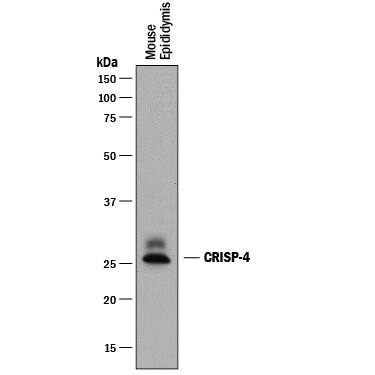Mouse CRISP-4 Antibody
R&D Systems, part of Bio-Techne | Catalog # AF5017


Key Product Details
Species Reactivity
Validated:
Cited:
Applications
Validated:
Cited:
Label
Antibody Source
Product Specifications
Immunogen
Leu23-Lys250
Accession # NP_084309
Specificity
Clonality
Host
Isotype
Scientific Data Images for Mouse CRISP-4 Antibody
Detection of Mouse CRISP-4 by Western Blot.
Western blot shows lysates of mouse epididymis tissue. PVDF membrane was probed with 0.2 µg/mL of Sheep Anti-Mouse CRISP-4 Antigen Affinity-purified Polyclonal Antibody (Catalog # AF5017) followed by HRP-conjugated Anti-Sheep IgG Secondary Antibody (Catalog # HAF016). Specific bands were detected for CRISP-4 at approximately 26-30 kDa (as indicated). This experiment was conducted under reducing conditions and using Immunoblot Buffer Group 1.Applications for Mouse CRISP-4 Antibody
Western Blot
Sample: Mouse epididymis tissue
Formulation, Preparation, and Storage
Purification
Reconstitution
Formulation
Shipping
Stability & Storage
- 12 months from date of receipt, -20 to -70 °C as supplied.
- 1 month, 2 to 8 °C under sterile conditions after reconstitution.
- 6 months, -20 to -70 °C under sterile conditions after reconstitution.
Background: CRISP-4
CRISP‑4 (cysteine‑rich secretory protein 4) is a secreted, 31 kDa member of the CRISP family of proteins. In mouse, its expression is limited to the epididymis, seminal vesicle and vas deferens and it appears to bind to differentiating sperm. Mature mouse CRISP‑4 is 230 amino acids (aa) in length. It contains an SCP (sperm coating protein) region (aa 42‑178) followed by a C‑terminal CRISP domain (aa 196‑250). There appears to be an alternate start site four amino acids upstream of the standard start site. Over aa 22‑550, mouse CRISP‑4 shares 90% aa identity with rat CRISP‑4 and 64% aa identity with human CRISP‑1, the human ortholog to mouse CRISP‑4.
Long Name
Alternate Names
Gene Symbol
UniProt
Additional CRISP-4 Products
Product Documents for Mouse CRISP-4 Antibody
Product Specific Notices for Mouse CRISP-4 Antibody
For research use only